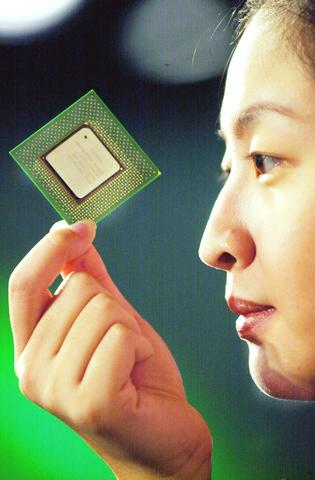Intel Taiwan introduced its new chip to Taiwan yesterday with major motherboard makers -- Giga-Byte Technology Co (技嘉), Micro-Star International Co (微星) and Asustek Computer Inc (華碩) -- announcing their allegiance to the Pentium 4.
The new Pentium 4, which utilizies Intel's NetBurst micro-architecture technology, has two different versions that run at 1.4 GHz and 1.5GHz respectively. The company claimed that the new processor is the biggest breakthrough in processor technology in five years -- three times faster than the Pentium III.

PHOTO: CHEN CHENG-CHANG, TAIPEI TIMES
But the new chip is expected to face strong competition from rival Advanced Micro Devices' (超微) Athlon chip. Intel claims the new processor will help upgrade Pentium-based systems that offer advanced audio/video, 3-D and animation performance over comparable systems in the marketplace, said Stanley Huang (
According to Huang, several Taiwan motherboard makers -- including Acer Inc (宏基), GVC Corp (致福) and Mitac Corp (神達) -- are set to produce boards equipped with Rambus memory chips to support the Pentium 4. In addition, he expects Pentium 4 to account for 50 percent of the company's total chip output in early 2002, adding that both Pentium 4 and Pentium III processors will continue to co-exist for another year or two.
But due to the company's insistence on using its 850 chipsets to manage the information flow between the Pentium 4 processor and the Rambus-type memory chips, industry analysts have cast doubt on the company's intention to make the Pentium 4 a mainstay for desktop PCs over the next two years.
"Whenever Intel introduces a new processor or chipset, Taiwan's first-tier motherboard makers usually come out with new boards based on that architecture," said Andrew Teng (鄧安瀾), analyst at Taiwan International Securities Corp (金鼎綜合證券). "But can Intel produce enough 850 chipsets to match the company's needs?" Teng said.
"Since Rambus memory chips are more expensive than other standards currently being used -- including DDR [double data rate] and SDRAM [synchronous dynamic random access memory] -- higher production costs are my second concern over the company's plan to dominate the chip market with the Pentium 4," he said.
While Intel currently employs the Rambus memory architecture, the company has not ruled out the possibility of using DDR or SDRAM capable chipsets made by third parties such as VIA Technology Inc (

Merida Industry Co (美利達) has seen signs of recovery in the US and European markets this year, as customers are gradually depleting their inventories, the bicycle maker told shareholders yesterday. Given robust growth in new orders at its Taiwanese factory, coupled with its subsidiaries’ improving performance, Merida said it remains confident about the bicycle market’s prospects and expects steady growth in its core business this year. CAUTION ON CHINA However, the company must handle the Chinese market with great caution, as sales of road bikes there have declined significantly, affecting its revenue and profitability, Merida said in a statement, adding that it would

i Gasoline and diesel prices at fuel stations are this week to rise NT$0.1 per liter, as tensions in the Middle East pushed crude oil prices higher last week, CPC Corp, Taiwan (台灣中油) and Formosa Petrochemical Corp (台塑石化) said yesterday. International crude oil prices last week rose for the third consecutive week due to an escalating conflict between Israel and Iran, as the market is concerned that the situation in the Middle East might affect crude oil supply, CPC and Formosa said in separate statements. Front-month Brent crude oil futures — the international oil benchmark — rose 3.75 percent to settle at US$77.01

RISING: Strong exports, and life insurance companies’ efforts to manage currency risks indicates the NT dollar would eventually pass the 29 level, an expert said The New Taiwan dollar yesterday rallied to its strongest in three years amid inflows to the nation’s stock market and broad-based weakness in the US dollar. Exporter sales of the US currency and a repatriation of funds from local asset managers also played a role, said two traders, who asked not to be identified as they were not authorized to speak publicly. State-owned banks were seen buying the greenback yesterday, but only at a moderate scale, the traders said. The local currency gained 0.77 percent, outperforming almost all of its Asian peers, to close at NT$29.165 per US dollar in Taipei trading yesterday. The

RECORD LOW: Global firms’ increased inventories, tariff disputes not yet impacting Taiwan and new graduates not yet entering the market contributed to the decrease Taiwan’s unemployment rate last month dropped to 3.3 percent, the lowest for the month in 25 years, as strong exports and resilient domestic demand boosted hiring across various sectors, the Directorate-General of Budget, Accounting and Statistics (DGBAS) said yesterday. After seasonal adjustments, the jobless rate eased to 3.34 percent, the best performance in 24 years, suggesting a stable labor market, although a mild increase is expected with the graduation season from this month through August, the statistics agency said. “Potential shocks from tariff disputes between the US and China have yet to affect Taiwan’s job market,” Census Department Deputy Director Tan Wen-ling